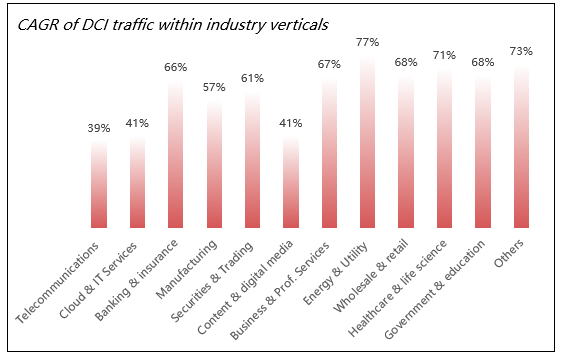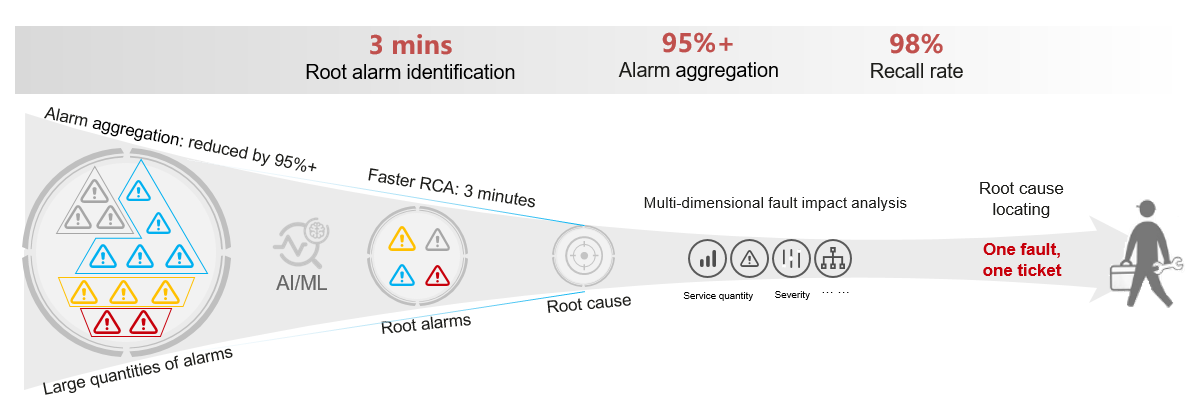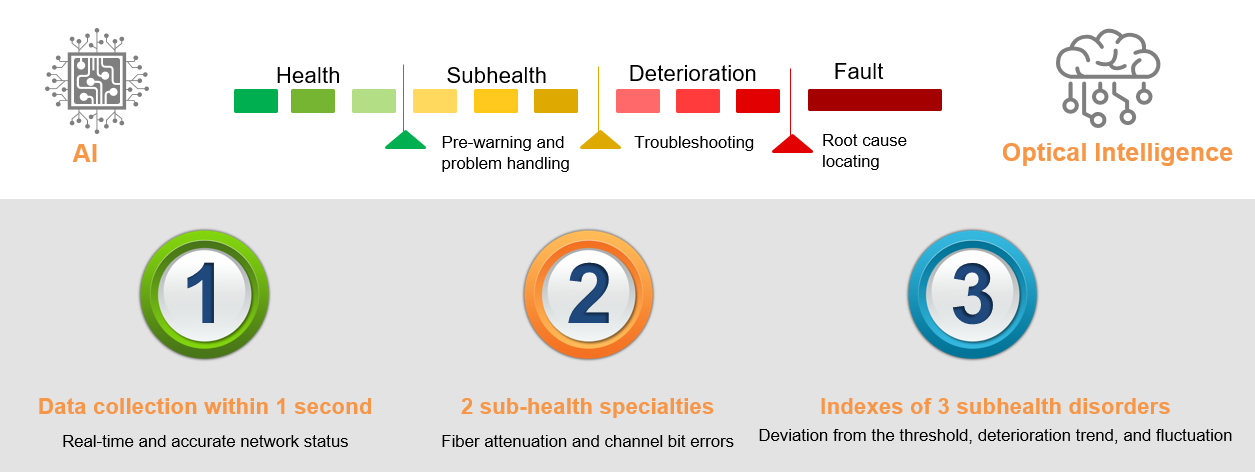Prodotti, soluzioni e servizi per le aziende
As we move towards Digital Transformation 2.0, digitalization has become the foundation of enterprise survival, rather than just a way to reduce costs and improve efficiency. And in this digital era, data centers have become a significant source of value creation. Equinix — a leading global data carrier — predicts a new round of exponential growth for data centers, with a forecasted Compound Annual Growth Rate (CAGR) of 51% for Data Center Interconnect (DCI) traffic from 2018 to 2022.

Source: Equinix
Indeed, the COVID-19 outbreak has highlighted the importance of owning solid DCI networks. From telecommuting to the End to End (E2E) benefits of efficient Research and Development (R&D), production, and sales, the provisioning speed and stability of DCI networks determine an enterprise's response speed and innovative ability during a state of emergency. Based on data center applications, services such as online commerce, online education, telemedicine, and telecommuting can be rolled out in an incredibly short time-frame, playing a significant part in saving lives as well as livelihoods. That said, the current DCI networks of enterprises face several challenges.
Faster service rollout: With the exponential growth of data, an increasing number of new data centers need to be built, with existing data centers in additional need of capacity expansion. Improving time-efficiencies for provisioning services is now essential. And a limited network Operations and Maintenance (O&M) workforce only compounds the issue.
Quicker alarm identification: In a network with elevated complexity that is inundated by invalid alarms, manual evaluation and case handling are no longer a realistic proposition in terms of keeping pace with a growing workload. Any delays in rectifying network faults, directly results in enormous losses to enterprises.
Detection of network faults in advance: Currently, network O&M is passive and cannot detect potential faults in advance. Specifically, fiber deterioration in a DCI network is undetectable, inevitably resulting in constant reactive maintenance as the modus operandi.
Active/standby fibers in different cables: Optical fibers are the most important transmission media in data centers. Usually, enterprises lease two fibers as a form of protection, enhancing the reliability of a DCI network. However, there is no current effective method to understand whether two fibers share the same cable.
Based on in-depth analysis of the challenges and trends of DCI networks, and empowered by technical discussions with key DCI customers, Huawei has developed an industry-leading solution for next-generation autonomous DCI networks. And it effectively resolves all of the customer pain points that we've identified.
Super Rapid Optical Deployment
For instance, simplified network construction and one-click deployment shorten service provisioning from four days to just eight minutes, an astonishing reduction.
This is achieved by improving both technologies and architectures. With the automation capability of iMaster Network Cloud Engine (NCE) and the optical-electrical feature of OptiXtrans DC908, automatic deployment is achieved, shortening the service rollout time while assisting enterprises to quickly respond to service requirements.

Figure 1: One-click deployment
Intelligent Alarm Management, Identifying Root Alarms in Three Minutes
Optical Transport Networks (OTNs) are hierarchical, meaning a fault brings massive correlative alarms. Alarm suppression on traditional Network Management Systems (NMSs) depends on individual, manual experience, which requires one to two hours for root alarm identification. Building on Artificial Intelligence (AI) algorithms — such as neural networks and three-level intelligent compression technology — intelligent alarm management of iMaster NCE can identify the root cause within three minutes and reduce irrelevant alarms by more than 95%, thereby helping enterprises dramatically reduce losses caused by network faults.

Figure 2: Irrelevant alarms reduced by 95%
Fiber Health Prediction with 95% Accuracy
A majority of fiber faults are rectified only after occurrence due to the lack of identification measures. With a more advanced sensor probe, AI, and big data technologies, iMaster NCE can collect hundreds of real-time optical network parameters on a live network in seconds and perform digital modeling to accurately identify the sub-health status of fibers. Based on the location and urgency of sub-healthy alarms, the system provides proactive O&M suggestions with different priorities, including automatic optical-layer commissioning and planned manual intervention. Fiber health prediction empowers the shift from reactive to pre-planned O&M, preventing financial losses caused by fiber deterioration in data centers.

Figure 3: Fault deterioration identified in advance and quickly located
Co-Cable Fiber Detection Avoids Active and Standby Fibers in the Same Cable
To prevent losses caused by fiber cuts, enterprises have a tendency to configure active/standby optical fibers; this protection mode requires fibers in different cables. The prevention of a co-cable situation has been a perpetual concern in the industry. Now, with iMaster NCE, AI algorithms quickly identify network risks stemming from co-cable fibers, fundamentally ensuring real-time online services.
As enterprises are deepening digital transformation, they are becoming ever more dependent on DCI networks. Yet, most enterprises lack the professional technical support required by traditional DCI networks. To combat this problem, Huawei has released an autonomous DCI solution that shortens service provisioning time, accelerates fault handling, identifies potential network risks, and discovers co-cable fibers. These new capabilities can translate into better monetization for enterprises. Ultimately, Huawei strives to advance DCI networks towards autonomous driving by working closely with both global partners and customers.